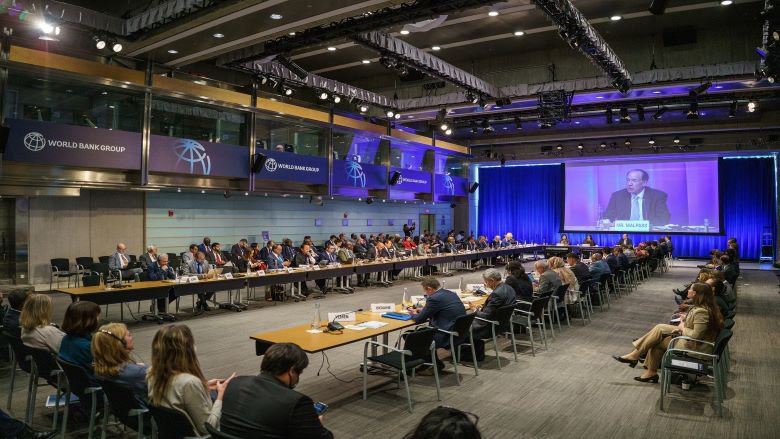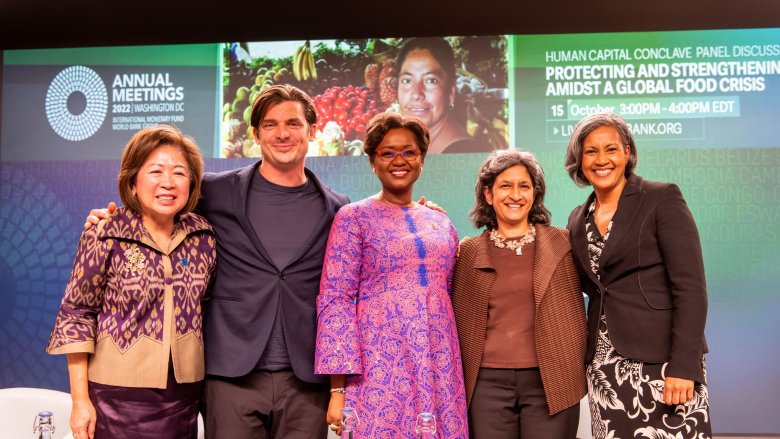Targeted cash transfers, productive inclusion programs, and resilient nutrition systems are helping governments worldwide reach their vulnerable populations and address price hikes.

[Photo: Participants at the 2022 Annual Meeting Human Capital Ministerial Conclave.]
On October 15th, 2022, 44 countries, and approximately 200 participants joined the 2022 Annual Meetings Human Capital Ministerial Conclave. The event’s two themes focused on providing immediate support to the vulnerable, while building shock-resilient social protection systems, and investing in sustainable food and nutrition security. The event underscored the importance of the whole-of-government approach promoted by the Human Capital Project, a global effort to accelerate more and better investments in people for greater equity and economic growth.
The current overlapping global crises have reversed decades of progress in human capital outcomes. There is an urgent need for strong investments in human capital to restore and bolster human capital outcomes, supporting individuals and communities in achieving their full potential.
Using Targeted Cash Transfer Programs to Reach the Vulnerable
Targeted cash transfer programs underpinned by social registries can shield the poor and vulnerable from the immediate impacts of food and other price hikes. Ministers from around the world highlighted the importance of these interventions and shared experiences from their respective countries.
Madagascar’s Finance Minister, for instance, discussed their Productive Social Nets program which enhances human capital by operating labor-intensive projects and providing technical training on agricultural production. Paraguay’s Finance Minister spoke of supporting workers in the informal sector during the pandemic, by way of monetary transfers. With more than a quarter of the country’s population living in poverty and some 65 percent working in the informal sector, deploying benefits became a challenge. The government took advantage of the high prevalence of mobile phones to deploy the country’s electronic payment system.
In FY20-22, the World Bank Group’s lending to social protection, health, and education grew to more than $60 billion—an increase from $28 billion from three prior fiscal years. The Bank Group is also providing technical assistance to countries to ensure effective program implementation.
For more information, please click here to read the conclave summary.
[Video: 2022 Annual Meetings Human Capital Ministerial Conclave.]
Building Household Resilience Through Productive Inclusive Programs
Beyond cash benefits, productive inclusive programs that focus on education and building entrepreneurship and socio-emotional skills are essential to attain increased household resilience in the long-run. For instance, the General Secretary of the Supreme Council for Planning and Development of Kuwait talked about the challenges associated with graduating beneficiaries from social protection programs, including supporting female entrepreneurs by helping boost their confidence and business skills. He noted that cash transfers are not always enough, and to address this challenge Kuwait is piloting productive inclusion programs to increase support.
Pakistan’s Minister of State for Finance and Revenue highlighted the critical role that robust social registry and digital payment system played in providing support to households as the country responded to devastating floods. Pakistan is also prioritizing programs that will help beneficiaries graduate from government transfers and is working with non-profit organizations that will provide skills training in entrepreneurship for women and youth.
For more information, please click here to read the conclave summary.

[Photo: Mari Pangestu, World Bank Managing Director for Development Policy and Partnerships; Josh Tetrick, Co-founder & CEO, Eat Just, Inc.; Oulimata Sarr, Minister of Economy, Planning and Cooperation, Senegal; Mamta Murthi, Vice President for Human Development and moderator Shakuntala Santhiran at the 2022 Annual Meetings Human Capital Ministerial Conclave Open Event.]
Supporting Sustainable, Nutritious, and Affordable Food Systems
Governments can support sustainable, nutritious, and affordable food systems in a range of ways, including through technology transfer, financing, agricultural extension, skills development, and, importantly, by avoiding universal subsidies and trade restrictions. For instance, the Minister of Economy, Planning and Cooperation of Senegal, who is also the current Chair of the Human Capital Network, explained that Senegal employs a five-pronged approach, including policies on land access that focus on a value chain approach, creating “agri-poles” or regions that specialize in the production of certain crops; skills training in water and energy resource management for farmers; advancing financing for adaptation measures and agri-insurance; improving access to markets; and supporting basic infrastructure and data sharing. The Minister also emphasized the need to decrease post-harvest losses.
Angola’s Minister of Economy and Planning shared the country’s experience in implementing a school lunch program to address high rates of chronic child malnutrition. School lunches are sourced from local farmers thereby helping support the rural economy. Similarly in Timor-Leste, the government is addressing micro-nutrient deficiencies in children by allocating a $10 million annual fund for the next five years. The country is also providing monthly payments to families with pregnant women and children up to the age of six and children living with disabilities through the ‘Mother’s Purse - New Generation’ cash transfer program.
To support our clients in these unprecedented times, $30 billion out of the $170 billion World Bank surge in financing commitments has been pledged towards food security, providing immediate response but also strengthening food systems to build resilience in the long term.
To inspire a broader audience to address threats to human capital, an open-door panel with the World Bank’s Managing Director for Development Policy and Partnerships Mari Pangestu, Mamta Murthi, World Bank’s Vice President for Human Development, Oulimata Sarr, Senegal’s Minister of Economy, Planning and Cooperation, and Josh Tetrick, Co-founder & CEO of Eat Just, Inc. shared key takeaways from the Conclave as well as discussed solutions to tackle the food and nutrition crisis, particularly as climate change threatens global agricultural productivity.
The need for local partnerships and innovations was a recurring theme as Minister Sarr shared how Senegal’s school meal program collaborates with community farmers to feed pupils. As countries design interventions specific to their contexts, Ms. Pangestu ended on a crucial point: “we need to be realistic and innovative as countries face resource constraints and deal with multiple overlapping crises.”
To view the open-door panel discussion, please click here.